I am really bugged by how people speak of contraception as if it is a "woman's issue."
The thing is, if a woman conceives a child, a man becomes a father.
If a woman does not conceive a child, neither has the man with whom she was involved fathered a child.
Conception, parenthood, contraception, all of these involve two people. (three, actually, if we include the child.)
The assumption in debates regarding contraception repeatedly seems to be that "men" are the ones that don't want women to use contraceptives. If someone is against contraception, then people who are for it are like "Oh, you think her body should be owned by her husband." Where did this assumption that the husband (or boyfriend) of the woman in question wants her to become pregnant?
Why forget that some women might want to become pregnant?
There are men who want to be fathers, and women who want to be mothers. There are men who do not want to father a child, and women who do not want to conceive a child.
There are couples who agree that they do not want children (or more children, or do not want children yet), there are couples who agree that they want children, there are also instances where the man wants a child and the woman does not, there are instances where the woman wants a child and the man does not.
There could be cases where a husband pressures his wife to refrain from contraceptives. (I don't know of instances of this, but it is a possibility)
There could just as easily be cases where a husband is the one who pressures his wife to keep using contraceptives.
(there are polls that show a lot of women have lied or would lie, saying they were "on the Pill" in order to get pregnant.) http://www.dailymail.co.uk/femail/article-203303/To-tell-truth-women-lie.html
http://www.angryharry.com/reWomenLieCheatSteal.htm
https://nationalparentsorganization.org/blog/21034-study-one-third-of-college-women-lied-about-contraception-use
Acting as if anti-contraception is taking the side of the man against the woman, is drastically over simplifying things.
The thing is, if a woman conceives a child, a man becomes a father.
If a woman does not conceive a child, neither has the man with whom she was involved fathered a child.
Conception, parenthood, contraception, all of these involve two people. (three, actually, if we include the child.)
The assumption in debates regarding contraception repeatedly seems to be that "men" are the ones that don't want women to use contraceptives. If someone is against contraception, then people who are for it are like "Oh, you think her body should be owned by her husband." Where did this assumption that the husband (or boyfriend) of the woman in question wants her to become pregnant?
Why forget that some women might want to become pregnant?
There are men who want to be fathers, and women who want to be mothers. There are men who do not want to father a child, and women who do not want to conceive a child.
There are couples who agree that they do not want children (or more children, or do not want children yet), there are couples who agree that they want children, there are also instances where the man wants a child and the woman does not, there are instances where the woman wants a child and the man does not.
There could be cases where a husband pressures his wife to refrain from contraceptives. (I don't know of instances of this, but it is a possibility)
There could just as easily be cases where a husband is the one who pressures his wife to keep using contraceptives.
(there are polls that show a lot of women have lied or would lie, saying they were "on the Pill" in order to get pregnant.) http://www.dailymail.co.uk/femail/article-203303/To-tell-truth-women-lie.html
http://www.angryharry.com/reWomenLieCheatSteal.htm
https://nationalparentsorganization.org/blog/21034-study-one-third-of-college-women-lied-about-contraception-use
Acting as if anti-contraception is taking the side of the man against the woman, is drastically over simplifying things.

